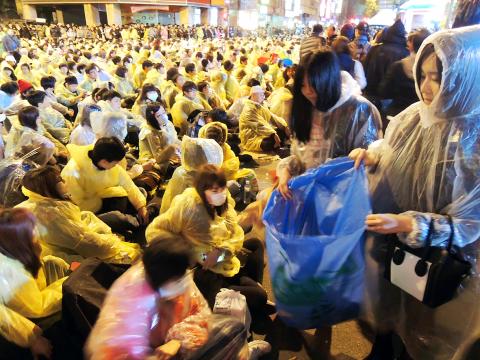Hundreds of students surprised the nation on Tuesday night when they broke off from an overnight sit-in and occupied the legislature in protest against the Chinese Nationalist Party (KMT) caucus’ handling of the cross-strait service trade pact.
After successfully fending off several evacuation attempts by the police and garnering national support over the past five days, the protest, which the media have dubbed the “Sunflower movement” — the largest student movement since the Wild Lily movement in 1990 that propelled legislative reform.
There are skeptics questioning almost everything about the group of young people — from their storming of the legislative compound and drinking beer in the legislative chamber, to their connections with opposition parties and their knowledge about the trade pact.

Photo: Hsieh Wen-hua, Taipei Times
In particular, there have been many questions about the cause and sustainability of the movement.
The students have been responding to these queries on an hourly basis.
In the legislature and the rallies outside the Legislative Yuan compound, students organized into groups to clean graffiti from the walls, recycle trash and maintain order.
Set up like a well-trained army unit, the students were divided into various teams of logistics, communication, patrol and — with help from volunteer physicians and lawyers — a medical team and a legal team were quickly assembled.
That was partly because the leaders of the movement, National Taiwan University graduate student Lin Fei-fan (林飛帆) and National Tsing Hua University student Chen Wei-ting (陳為廷), as well as other members of the core leadership are seasoned veterans in social movements despite their youth.
They gained experience from numerous protests in the past two years, including the one against land seizures at Miaoli County’s Dapu Borough (大埔) and the construction of the Miramar resort in Taitung County, the campaign against media monopolization and the anti-nuclear movement.
Well aware of the nation’s political situation, the students have distanced themselves from political parties and stayed away from the so-called “blue-green struggle.”
Quite contrary to what several local media outlets and the KMT portray, most of the students in those protests have been able to explain their cause clearly and stand firmly for what they believed in.
The “Sunflower movement” is more than an overnight phenomenon and should be interpreted beyond these young people’s discontent with President Ma Ying-jeou’s (馬英九) governance.
It is the cultivation of the students’ effort in the past two years, during which they defied conventional views about the younger generation — that they could not care less about politics and the world they live in — and showed Taiwanese that they do care and they would take action to make the country a better place — any time and anywhere.
If today’s group of young activists have learned from what happened to the “Wild Lily generation,” some of them are more than likely to become the backbone of Taiwanese politics and social movements in the next 10 years.
From what people have seen so far, the new young activists show a deep caring for the nation and for the purity of politics as it was in the early 1990s.

ANOTHER EMERGES: The CWA yesterday said this year’s fourth storm of the typhoon season had formed in the South China Sea, but was not expected to affect Taiwan Tropical Storm Gaemi has intensified slightly as it heads toward Taiwan, where it is expected to affect the country in the coming days, the Central Weather Administration (CWA) said yesterday. As of 8am yesterday, the 120km-radius storm was 800km southeast of Oluanpi (鵝鑾鼻), Taiwan’s southernmost tip, moving at 9kph northwest, the agency said. A sea warning for Gaemi could be issued tonight at the earliest, it said, adding that the storm is projected to be closest to Taiwan on Wednesday or Thursday. Gaemi’s potential effect on Taiwan remains unclear, as that would depend on its direction, radius and intensity, forecasters said. Former Weather Forecast

As COVID-19 cases in Japan have been increasing for 10 consecutive weeks, people should get vaccinated before visiting the nation, the Centers for Disease Control (CDC) said. The centers reported 773 hospitalizations and 124 deaths related to COVID-19 in Taiwan last week. CDC Epidemic Intelligence Center Director Guo Hung-wei (郭宏偉) on Tuesday said the number of weekly COVID-19 cases reported in Japan has been increasing since mid-May and surpassed 55,000 cases from July 8 to July 14. The average number of COVID-19 patients at Japan’s healthcare facilities that week was also 1.39 times that of the week before and KP.3 is the dominant

The Chinese Communist Party’s (CCP) working group for Taiwan-related policies is likely to be upgraded to a committee-level body, a report commissioned by the Mainland Affairs Council (MAC) said. As Chinese President Xi Jinping (習近平) is increasingly likely to upgrade the CCP’s Central Leading Group for Taiwan Affairs, Taiwanese authorities should prepare by researching Xi and the CCP, the report said. At the third plenary session of the 20th Central Committee of the CCP, which ended on Thursday last week, the party set a target of 2029 for the completion of some tasks, meaning that Xi is likely preparing to

US-CHINA TRADE DISPUTE: Despite Beijing’s offer of preferential treatment, the lure of China has dimmed as Taiwanese and international investors move out Japan and the US have become the favored destinations for Taiwanese graduates as China’s attraction has waned over the years, the Ministry of Labor said. According to the ministry’s latest income and employment advisory published this month, 3,215 Taiwanese university graduates from the class of 2020 went to Japan, surpassing for the first time the 2,881 graduates who went to China. A total of 2,300 graduates from the class of 2021 went to the US, compared with the 2,262 who went to China, the document showed. The trend continued for the class of 2023, of whom 1,460 went to Japan, 1,334 went to